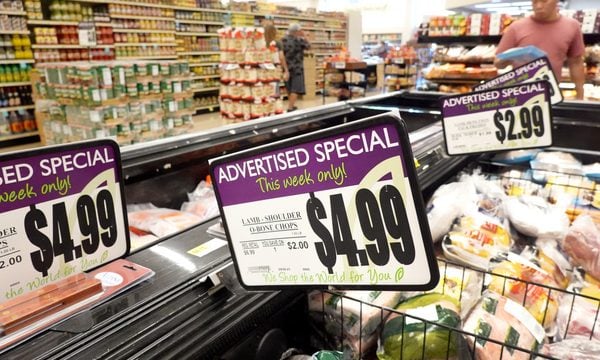Time Your Purchases Right: The Best Things to Buy Every Month
Knowing what items will likely be on sale each month can help you save money on planned purchases.

Many, or all, of the products featured on this page are from our advertising partners who compensate us when you take certain actions on our website or click to take an action on their website. However, this does not influence our evaluations. Our opinions are our own. Here is a list of our partners and here's how we make money.
A new year is a good opportunity to take charge of your personal budget and develop a strategy for buying the things you want.
Create a list of the big buys you plan to make this year and use our guide to prepare for popular sales and time each purchase right, so you can save money.
Retailer sale predictions are based on the timing of past events.
January
Fresh off the holidays, the first month of the year brings a fresh start for sales. These items are discounted in January:
- Bedding and linen. Department stores hold bedding and linen “white sales” in January with deep discounts on sheets and towels. Clothing and other home goods could be on the table, too.
- Fitness equipment. Retailers will meet goals to get in shape with decent deals. Expect workout gear and apparel sales galore at sporting goods stores. (Question for you: Will you use the discounted treadmill you buy? It’ll always be cheaper to walk around the block.)
- TVs and electronics. Just before the Super Bowl, retailers normally discount TVs and other home theater essentials.
Mark your calendar: Martin Luther King Jr. Day is Jan. 19.
Retailer sales to watch for in January: Macy’s semi-annual sale.
February
February might be a better time to buy major items for yourself than trinkets for your valentine. Options include:
- TVs. Television sales spill over from January into February ahead of the Super Bowl. Aside from Black Friday, this is one of the best times to buy a TV.
- Winter apparel. With winter winding down, retailers will be looking to unload warm-weather clothes and even the winter sports gear that’s no longer flying off the shelves.
- Home goods. Expect retailers to put home stuff on sale for Presidents Day and the weekend preceding the holiday.
- Leftover chocolate. The savvy couple does Valentine’s Day late to save a buck. Grab a heart-shaped box of candy on Feb. 15, when stores will be discounting Valentine’s Day leftovers.
Mark your calendar: Super Bowl Sunday is Feb. 8, Valentine's Day is Feb. 14 and Presidents Day is Feb. 16.
March
March is a surprisingly good sale month. Look for deals on these products:
- Tax software. The closer you get to April 15, the pricier tax software will be. Retailers often have discounts ahead of Tax Day.
- Beauty products: Ulta’s sale may make it worth your while to re-up on hair, makeup and skincare products this month.
- Home and garden at hardware stores: Both Home Depot and Lowe’s roll out the deals for the start of spring. Look for good buys on items that get you working outside (e.g., outdoor power equipment, grills, patio furniture and paint).
- St. Patrick’s Day essentials. Around St. Pat’s, online retailers and department stores usually discount green clothing, party supplies and jewelry.
- Vacuum cleaners: Some retailers — watch for an Amazon spring sale — will be ready to reward early spring cleaners with a deal on a Dyson, Shark or other brand of vacuum.
Mark your calendar: St. Patrick’s Day is March 17. Spring begins March 20.
Retailer sales to watch for in March: 21 Days of Beauty at Ulta Beauty; Lowe’s annual Springfest event; Amazon’s Big Spring Sale (it was March 25-31 in 2025).
>> MORE: The best things to buy on Amazon.
Stress less. Track more.
See the full picture: savings, debt, investments and more. Smarter money moves start in our app.
April
April brings legit spring deals and discounts, including on:
- Vacuums. April is the real cleaning month and will bring more deals on vacuums. Look for markdowns at retail stores as well as on manufacturers’ websites.
- Tax-themed items. Retailers and restaurants try to lighten the burden of Tax Day with discounts and freebies on services like paper shredding. Keep an eye out for these around mid-April.
- Mulch: Time to beautify your beds. Home improvement stores usually have good specials on bags in April.
- Sustainable items. To celebrate Earth Day, be on the lookout for deals on items you won’t waste, such as reusable totes and water bottles, responsibly made clothing and other products. Is this the year you start composting?
Mark your calendar: Easter Sunday is April 5 and Tax Day is April 15.
Retailer sales to watch out for in April: Home Depot’s Spring Black Friday sale (early April); Wayfair’s Way Day (probably late in the month).
May
April discounts give way to more in May. Here’s a look at some items to consider buying this month:
- Spring apparel. By May, retailers will discount spring clothing that has already been hanging on racks for a month or two.
- Summer outdoor adventure gear: It’s the month for REI’s best sale of the year, making it a great time to gear up for your next camping, hiking, cycling or running adventure.
- Furniture. Three of the biggest shopping days are Black Friday, Labor Day and Memorial Day. Memorial Day is in May, so look for furniture and home decor discounts from big-box stores.
- Small kitchen appliances. Use May discounts as an opportunity to buy small kitchen appliances, such as coffee makers and blenders. Typically, these products are included in Memorial Day sales, and they make great gifts for summer weddings.
Mark your calendar: Mother’s Day is May 10 and Memorial Day is May 25.
Retailer sales to watch out for in May: The REI Anniversary Sale (happens every May).
June
June has a lot of deals. Smart purchases include:
- Lingerie and women’s clothing. June is when Victoria’s Secret, for example, has been known to host its semiannual sale. The sale also typically occurs in December.
- Other semiannual sales. The midway point is known for sales at lots of stores. In past years, we’ve seen stores like Bath & Body Works and Brooks Brothers hold semiannual sales in June.
- Gym memberships. Consider buying a gym membership during the summer, and be sure to negotiate for the best deal. Gyms may be eager for sign-ups when people are more likely to spend time outside.
- Tools and other dad gifts. For Father’s Day, many retailers will offer deals on a variety of power tools and outdoor gear, as well as things like men’s clothing. Solo Stove has discounted its portable fire pits around this time in the past, for example.
Mark your calendar: Father’s Day is June 21.
Retailer sales to watch out for in June: Victoria’s Secret Semi-Annual Sale; the Zara summer sale.
July
In July, prices drop like it’s hot. Consider buying these:
- Summer apparel. The sun is still out, but demand for summer clothes starts to go down. So, buy up shorts, tanks and flip-flops while stores make it worth it. Buy only what’s on sale, though.
- July Fourth items. In the days leading up to Independence Day, there’s usually an abundance of sales on red, white and blue products, as well as on barbecue and backyard items, sporting goods, jewelry and furniture.
- Personal electronics on Prime Day. Amazon Prime Day is almost always in July. It’s basically summer Black Friday, and it’s a hot sale for electronics and gadgets, and basically everything else. It also drives other retailers to compete with copycat sales.
- School supplies. Kids won't want to think about the end of summer yet, but retailers will start putting school supplies on sale. If you have supply lists in hand, shopping back-to-school early can help you avoid the August rush.
Mark your calendar: Independence Day is July 4.
Retailer sales to watch out for in July: Amazon Prime Day; Target Circle Week
August
Close out summer by buying summer products? That’s right. Look for end-of-season clearance sales in August on:
- More back-to-school stuff. Now is the time for low-cost items like notebooks and pencils, and more expensive ones like calculators and laptops. Generally, the closer to the start of the school year you buy, the better your chances of getting a good price, but the selection might not be as good.
- Backyard products. Ride out the end of summer with a big deal on lawn mowers and other seasonal outdoor equipment, like grills.
- Swimsuits. There may not be many swimming days left by the time August rolls around, but that’s exactly why swimsuit clearance sales will crest. Buy swimsuits now for next year.
- Tax-free shopping. Many states offer a tax-free weekend to aid in the purchase of school supplies, clothes, computers and other approved necessities. If yours does, check the date and have your list ready.
Mark your calendar: For many school districts, the first day of school is in August.
September
With deals on items as varied as mattresses and pool toys, September is a surprisingly good month for good buys. Score reasonable prices on these:
- Mattresses. Year after year, September is a good time for mattress sales. Expect deals from department stores and mattress centers, usually as a part of Labor Day promotions.
- iPhones. Apple likes to announce new iPhones and other products in September. The unveiling is usually followed by a drop in prices on the models that have been around awhile and reductions on refurbished models.
- Appliances. Expect a series of blowout deals in the week leading up to Labor Day, including promotions on appliances big and small.
Mark your calendar: Labor Day is Sept. 7.
October
Retailers won't ghost you in October. There will be plenty of deals on these product categories:
- Outdoor furniture. Expect deals on patio furniture and outdoor living products when the weather turns cool.
- Jeans. Fall inventory arrives in stores in August and September, but you’ll pay top dollar unless you wait a few weeks. October is a great time to buy a new pair of jeans.
- Candy. The closer you get to Halloween, the better your chances of snagging a discounted bag of candy for trick-or-treaters.
- Holiday gifts. Amazon does Big Deal Days in October. It's like a second Prime Day that sparks similarly timed sales from retailers like Target, Walmart and Best Buy with deals that rival Black Friday and Cyber Monday. These events have made early October a top time to buy gifts or things you want for yourself.
Mark your calendar: Columbus Day/Indigenous Peoples Day is Oct. 12 and Halloween is Oct. 31.
Retailer sales to watch out for in October: Amazon Prime Big Deal Days.
November
November is the real month for Black Friday sales, which means some of the most popular technology products fall to their lowest prices. In fact, you can expect deals on just about everything, with discounts dropping throughout the month. Here are some specific categories to look for:
- Electronics. The best Black Friday deals are likely to be on gadgets like TVs, tablets and laptops. Look for discounts on headphones, smart speakers and activity trackers, too.
- Clothing. November has to be the busiest month for clothing catalogs. Scan the brands you like for discounts, and shop stores like Gap, Land’s End and American Eagle online for surprise coupon codes.
- Small kitchen appliances. Cyber Monday is Nov. 30, and it tends to be a great time to get kitchen gadgets, according to NerdWallet’s price-tracking research. Air fryers, stand mixers, blenders and coffee machines could go lowest on Cyber Monday.
- Streaming subscriptions: As if you need another password to remember, November has become a great time to sign up for a new streaming service. Popular content providers like Hulu and Paramount+ have offered solid subscription discounts during extended Black Friday sales in the past.
Mark your calendar: Thanksgiving is Nov. 26, Black Friday is Nov. 27 and Cyber Monday is Nov. 30.
Stress less. Track more.
See the full picture: savings, debt, investments and more. Smarter money moves start in our app.
December
The end of the year is just the beginning of discounts in some product categories. Look for sale prices on these items in December:
- Electronics. Those Black Friday electronics deals from late November will spill over into the new month.
- Toys. Toys are popular holiday gifts, and stores generally drop prices as the season draws to a close and inventory is left. Shop around Super Saturday — the last Saturday before Christmas — for possible discounts.
- Christmas decorations. Beginning the day after Christmas, shop sales for deep discounts — often upward of 50% — on decorations, wrapping paper, ornaments, artificial trees and similar seasonal fixings.
- Sporting goods: Look for savings on the things athletes need: balls, bats, clubs, cleats and more. Check out Amazon, Target and Dick’s Sporting Goods, or go directly to brand websites for deals.
Mark your calendar: Hanukkah is Dec. 4-12 and Christmas is Dec. 25.
Article sources
NerdWallet writers are subject matter authorities who use primary,
trustworthy sources to inform their work, including peer-reviewed
studies, government websites, academic research and interviews with
industry experts. All content is fact-checked for accuracy, timeliness
and relevance. You can learn more about NerdWallet's high
standards for journalism by reading our
editorial guidelines.
Related articles







